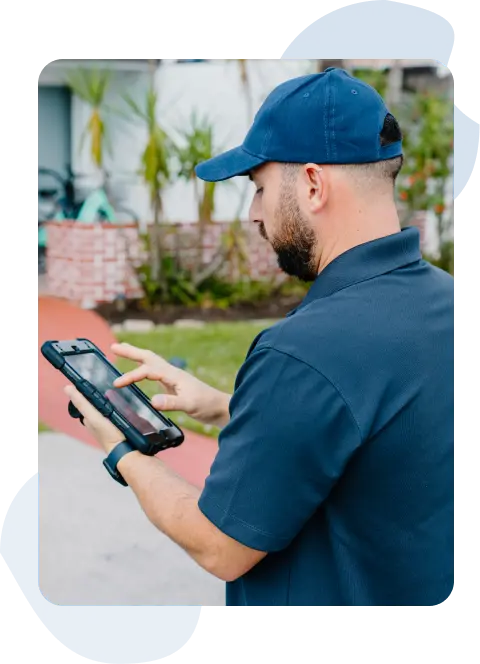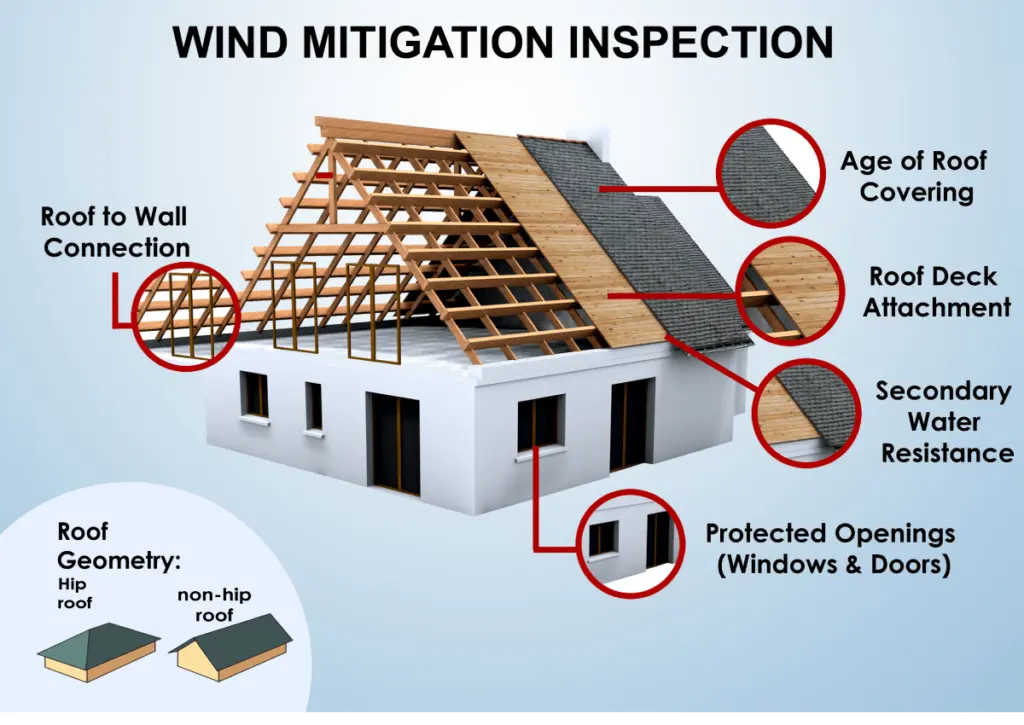Wind Mitigation Inspection for Hurricane Resilience
Strengthen Your Home Against High Velocity Winds
Unlock Discounts with Wind Mitigation Inspections
The word mitigation in the simplest terms means to reduce or redistribute force. If you are a new homeowner or a current one that for sure you have come along to this form.
The insurer will ask for this type of inspection so they can quote your wind insurance and discount your premium based on all the safety features your home qualifies.
As this form was corrected and revised multiple times since its adoption it can be complex and easily misunderstood, thus is really important for an inspector who has knowledge and experience to perform a wind mitigation inspection and fill up the form correctly.
So don’t hesitate and call Next Day Inspections to determine correctly the level of protection your home has! We are a step away from your area.


Schedule your home inspection
Comprehensive Property Inspection
Same-Day Inspection Reporting
EXCELLENTTrustindex verifies that the original source of the review is Google. Great service and excellent customer service from Miki, he was always available to answer any queries and I had the report sent over by the end of the day. Thank you.Trustindex verifies that the original source of the review is Google. Great company to work with annd easy process. Always made time to explain stuff.Trustindex verifies that the original source of the review is Google. We are delighted to recommend Miki from Next Day Inspections. We were impressed with his demeanor and his attention to detail. His report was very thorough and we felt like our home inspection was in great hands!Trustindex verifies that the original source of the review is Google. Miki did amazing job. Very detailed oriented!Trustindex verifies that the original source of the review is Google. Miki was thorough, knowledgeable, and took the time to explain their findings in detail, ensuring I understood all aspects of the report. Their professionalism and attention to detail gave me confidence in making an informed decision. I highly recommend Miki Nikolovski to anyone in need of a reliable and trustworthy home inspection.Trustindex verifies that the original source of the review is Google. Miki was prompt, professional, and pleasant. We got our 4 point report within an hour.Trustindex verifies that the original source of the review is Google. His name says it all... My clients had a quick deadline and were looking for a "next day" inspector. Miki was great!! He showed up on time and was very thorough with his report. Would highly recommend Next Day Inspections.Trustindex verifies that the original source of the review is Google. Today we meet with Miki for our home inspection. He was ensuring all aspects of the project were meticulously checked. He arrived on time, demonstrated a keen attention to detail, and communicated any findings clearly and professionally. Miki’s expertise and proactive approach gave us confidence that the work is up to standard and any potential issues were addressed promptly. Overall, I am very satisfied with his inspection and would gladly recommend his services for future needs. Thank you Miki.Trustindex verifies that the original source of the review is Google. Mikki was amazing. Very knowledgeable and Thural. My buyers were very happy to have used his company for the home inspectionTrustindex verifies that the original source of the review is Google. Miki conducted a very thorough inspection and gave me insight. I now know how to move forward. Thanks!
A wind mitigation inspection is a specific type of home inspection conducted to assess the structural and protective measures of a property that may reduce wind damage during a storm or hurricane. It focuses on features that can decrease the risk of wind-related damage.
Wind mitigation inspections are crucial in Florida due to the state’s vulnerability to hurricanes and strong wind events. Insurance companies often require these inspections to evaluate the property’s risk and determine insurance premiums.
In Florida, a qualified and licensed inspector, such as a building inspector or certified professional with expertise in wind mitigation, can perform the inspection. It’s important to choose an inspector experienced in evaluating wind-resistant features.
A wind mitigation inspection evaluates various features, including the roof covering, roof-to-wall connections, roof geometry, gable end bracing, opening protection (such as impact-resistant windows and doors), and the presence of a secondary water barrier.
The type and condition of the roof covering are assessed to determine its resistance to wind uplift. Materials like asphalt shingles, metal roofing, or tile with proper installation can provide wind-resistant properties.
Roof-to-wall connections refer to the methods used to secure the roof structure to the walls of the building. Properly reinforced connections, such as hurricane straps or clips, can enhance the roof’s ability to withstand high winds.
The shape and design of the roof, including its slope and orientation, impact wind resistance. Certain roof shapes and configurations are better suited to resist wind loads than others.
Gable end bracing refers to the reinforcement of the triangular section of a wall between the two slopes of a gable roof. Proper bracing helps prevent the roof from collapsing during high winds.
Opening protection, such as impact-resistant windows, doors, and shutters, plays a significant role in preventing wind-borne debris from breaching the home’s interior during a storm, increasing overall safety and reducing damage.
A secondary water barrier is designed to provide an extra layer of protection against water intrusion if the primary roof covering fails. It’s often assessed by examining the presence of specific materials under the roof covering.
The duration of a wind mitigation inspection can vary based on the size and complexity of the property. On average, it can take a few hours to complete, allowing the inspector to thoroughly assess all wind-resistant features.
After the inspection, the inspector will provide a detailed report outlining the findings and any wind-resistant features identified. This report is used by insurance companies to assess the property’s eligibility for certain wind mitigation discounts and credits.
Yes, if the wind mitigation report identifies significant wind-resistant features, it may lead to insurance discounts or credits. Insurance companies in Florida often offer reduced premiums for properties with effective wind mitigation measures in place.
Monday - Friday (8am - 5pm)
Saturday (Appointment only)
Sunday (Closed)
Copyright © Next Day Inspection 2025 – Powered by Coding Factory